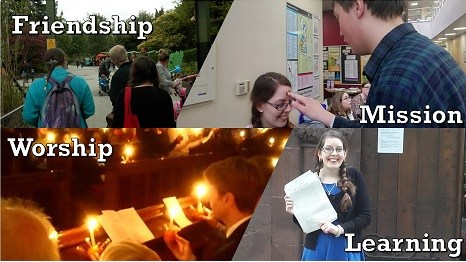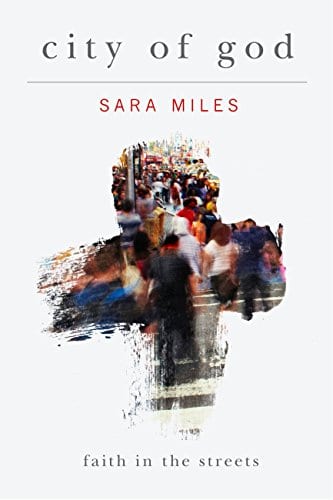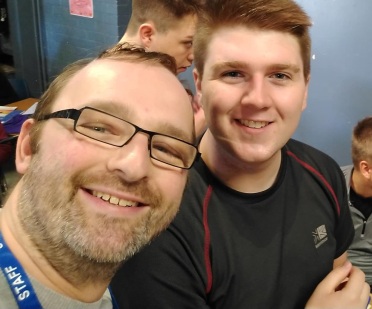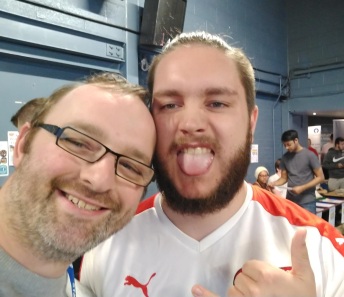As we continue our series of blogs from our leavers, here we have Hannah, a Masters Student in English Literature.
When you start postgraduate study, everybody warns you about how isolating it can be. Of course, on my induction day back in October, I don’t think anyone could have predicted how isolated I would become; I can’t even work in my garden because our Wi-Fi doesn’t get that far. As a post-grad student, you’re encouraged to make sure you have a support network and if I didn’t have Chaplaincy House to sit around in all day, every day, then I would have been incredibly lonely.  Chaplaincy has provided me with a strong group of cheerleaders, confidantes, sounding boards and pun generators, who have kept me endlessly supplied in tea, sympathy, and legs (Ed. These legs are chocolate and come from the Isle of Man. See picture) Only having four contact hours a week does free up time though. I had several new experiences this year as part of Chapel Community: we organised a whole Nativity procession, complete with costumes, props and Christingles; we went to Gladstone’s Library, and that bus to Warrington is an experience all on its own.
Chaplaincy has provided me with a strong group of cheerleaders, confidantes, sounding boards and pun generators, who have kept me endlessly supplied in tea, sympathy, and legs (Ed. These legs are chocolate and come from the Isle of Man. See picture) Only having four contact hours a week does free up time though. I had several new experiences this year as part of Chapel Community: we organised a whole Nativity procession, complete with costumes, props and Christingles; we went to Gladstone’s Library, and that bus to Warrington is an experience all on its own.
Obviously, the biggest thing that happened this year was the Nativity procession. I am so incredibly grateful for Patsy for organising the whole thing – her tenacity and verve is inspiring and really pushed us 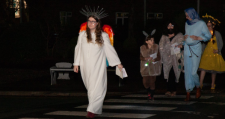 all forward into making it happen. It was so fun to be creative and to bring the Gospel to life; we had a chance to throw ourselves into this service, and we did, from Heather transforming her chariot into a camel to Rob’s sack. I still watch the film that Ruth made when I’m feeling a bit blue and remind myself of how wonderful our community here is.
all forward into making it happen. It was so fun to be creative and to bring the Gospel to life; we had a chance to throw ourselves into this service, and we did, from Heather transforming her chariot into a camel to Rob’s sack. I still watch the film that Ruth made when I’m feeling a bit blue and remind myself of how wonderful our community here is.
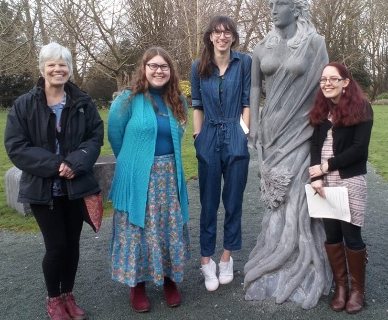
I also really enjoyed going to Gladstone’s Library together in January. Heather poured her heart and every scrap of energy she had into organising it for us, and I am incredibly grateful – she even made us a quiz, which I took back with me when I went with my friend in March. Chaplaincy has given me opportunities to go to places that I would be too anxious to visit otherwise, and these experiences and memories are ones I will cherish for years to come.
The second biggest thing this year was that we welcomed a new chaplain! Last year I said that one of the best things about Chapel was the way that although people come and go, the core of who we are as a community never changes. Last year we said goodbye to Chaplaincy stalwarts like Joseph, Matthew, and Fr. Robert but this year we welcomed Gill, who slotted right into our loving and friendly, if slightly eccentric, community. I’m very glad I was able to go to her installation service in Warrington; it was lovely to help officially welcome Gill into our community and to meet Bishop Keith, who comes from a tiny South London village called Carshalton. It also meant that after so many years hearing stories about this mysterious other campus, I finally experienced it for myself. It is as eerily quiet as the legends say: Alison took me, Debbie, and Patsy on a mini tour around the campus, and we hardly saw anyone!
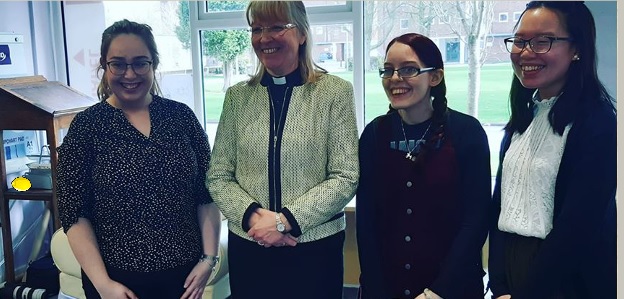
In the Gospel of Matthew, Christ says ‘where two or three are gathered in My name, I am there among them’ (Matthew 18.20). I wholeheartedly believe that in Chaplaincy, this does not apply just to our worship; instead, Christ is present in everything that we do. So many wonderful things happened this year which have strengthened us as a community, to the point that, even now as we are separated by hundreds of miles (and in some cases, a whole lot of water), we are still connected and we still feel like members of Chapel Community. After all, nothing brings a community together like an accidental Brexit party and nearly killing the chaplain with a non-alcoholic jelly shot. Thank you for being my support network this year and every other year. May we strive to keep Christ at the centre of our lives and our community here, letting his love shine through us in everything that we do, everything that we say, and everything that we are. Amen.
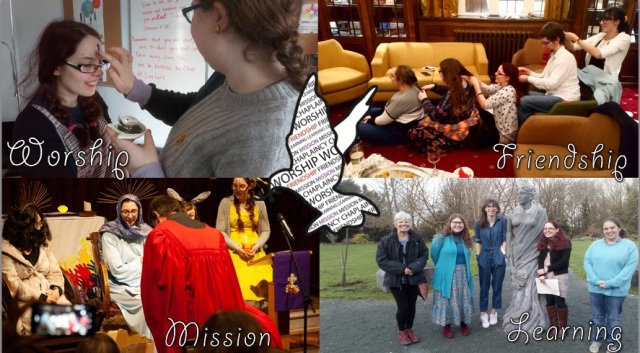


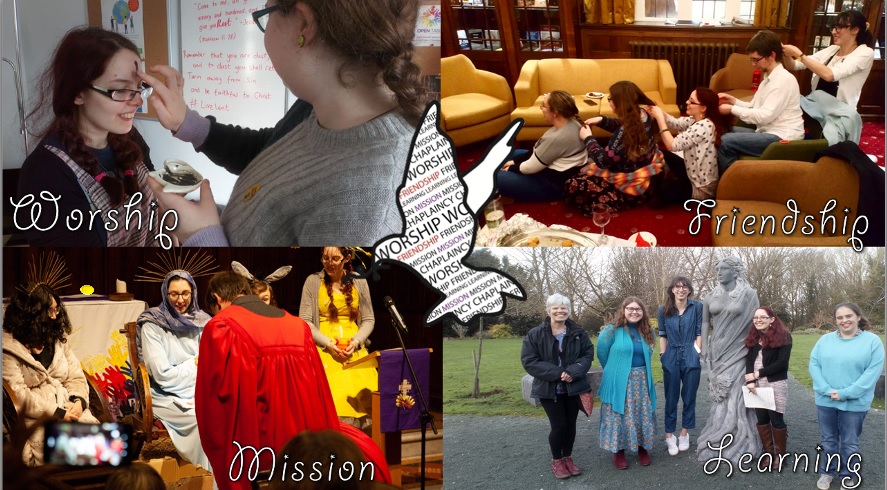

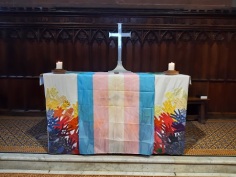
 names of the 291 trans people around the world who have been murdered this year. The week before we heard an inspiring talk about fasting in Islam. The next week we had a traditional Advent communion service. The following week we had students and staff dressed up in dressing gowns and cable-tie halos for a nativity procession around Parkgate Road campus and a Christingle service (like when you were seven).
names of the 291 trans people around the world who have been murdered this year. The week before we heard an inspiring talk about fasting in Islam. The next week we had a traditional Advent communion service. The following week we had students and staff dressed up in dressing gowns and cable-tie halos for a nativity procession around Parkgate Road campus and a Christingle service (like when you were seven).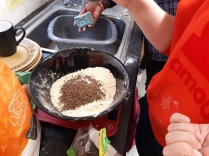 I run a weekly baking session, whilst kneading and making breadcrumbs, whole life stories come tumbling out. Many languages are spoken and we learn through bread and cakes about cultures from all over the world; all from the tiny kitchen in Chaplaincy House.
I run a weekly baking session, whilst kneading and making breadcrumbs, whole life stories come tumbling out. Many languages are spoken and we learn through bread and cakes about cultures from all over the world; all from the tiny kitchen in Chaplaincy House.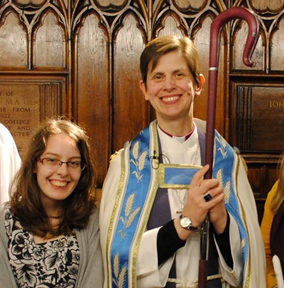 Of course, the biggest demonstration of the community showing me their love was that time I got baptised. That was pretty cool. The nicest thing, obviously aside from actually being baptised, was the number of cards that had someone’s name followed by the words “chapel community” in brackets. I think the fact that multiple people thought “you probably don’t remember who I am exactly, but I am thinking of you and wishing you well on this day” demonstrates the love inside this community.
Of course, the biggest demonstration of the community showing me their love was that time I got baptised. That was pretty cool. The nicest thing, obviously aside from actually being baptised, was the number of cards that had someone’s name followed by the words “chapel community” in brackets. I think the fact that multiple people thought “you probably don’t remember who I am exactly, but I am thinking of you and wishing you well on this day” demonstrates the love inside this community.
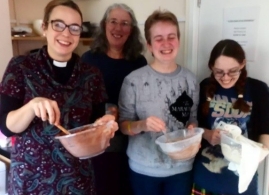 And then that weekend, we went away and it was sad! But then we came back! And there were new people, and suddenly I was the grown up in my fourth year of study taking freshers under my wing. And I was one of those final year students hanging around Chaplaincy House discussing my dissertation. And there were new things I’d never done before, like mobile ashing and baking. I started going to Faith & Food. There were more Chaplaincy trips. That sense of community grew stronger, like I’d never been gone. Sure, some people are gone
And then that weekend, we went away and it was sad! But then we came back! And there were new people, and suddenly I was the grown up in my fourth year of study taking freshers under my wing. And I was one of those final year students hanging around Chaplaincy House discussing my dissertation. And there were new things I’d never done before, like mobile ashing and baking. I started going to Faith & Food. There were more Chaplaincy trips. That sense of community grew stronger, like I’d never been gone. Sure, some people are gone 